- CORD
- 1) In heraldry see "corded" (below).
2) A length of decorative string or rope made from several twisted strands
with tassels at each end, generally made of silk (or a silk-like material) in
the livery or national colours (or gold/silver thread), simply knotted or tied
a bow at the centre and used to decorate a staff (usually) just below the finial –
especially (but not exclusively) that of a parade flag or military colour
aiguillette,
(see also colour 2),
cravat 1),
finial,
lanyard 1),
livery colours,
national colours 2),
parade flag 2),
staff 2) and
tassels).
- 2) As above but without tassels and used to finish the edges of a flag, usually
in the livery or national colours (or gold/silver thread).
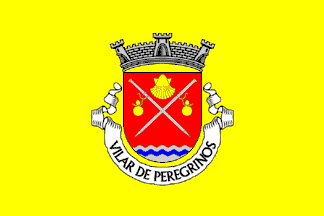
.jpg)
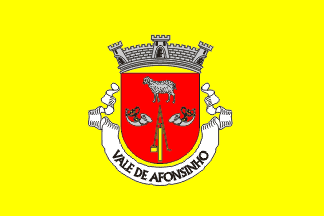
Flag of Vilar de Peregrinos, Portugal;
Ceremonial Flag [retrieved]
of Abedim-Moncao, Portugal;
Flag of Vale de Afonsinho, Portugal
- CORDED (or CORDONED)
- The heraldic term used to describe almost any charge bound with, or having, cords in a different
tincture – but see the note below and stringed
(also bugle horn,
crozier, garnished,
mitre and
tinctures).
.gif)
.gif)
.gif)
Arms of São Clemente de Basto, Portugal;
Former arms of Cerdedo, Portugal;
Arms of São Julião de Palácios e Deilão, Portugal
Please note that cord and corded are established heraldic terms, but to extend the word into
"cordoned" is, as far as can be discovered, not.
- CORDED CROSS
- See roped cross.

(Seiyaku.com)
- CORDS AND TASSELS
- See cord 2) and tassels.

Ceremonial Flag of Abedim-Moncao (detail), Portugal (fisisco)
- CORE FLAG
- The flag whose design forms the basis of other flags, or which inspired
the creation of other flags, with typical examples being the Arab revolt
flag of 1917 plus the French and Russian tricolours (see also
difference 1),
flag family,
pan-African Colours,
pan-Arab Colours,
pan-Slavic Colours
and template flag).
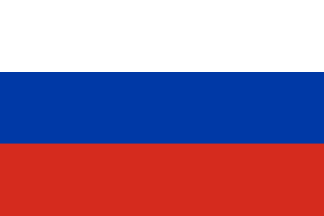
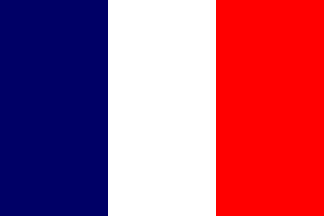
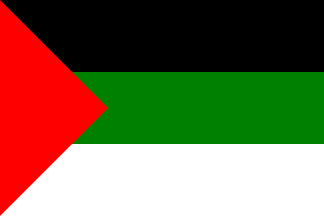
Russian Tricolour, French Tricolour,
Arab Revolt Flag 1917
- CORNET (or CORNETTE or CORNUTE)
- 1) In largely British maritime usage a term, now increasingly obsolete, for
a small triangular pennant (see also pennant 2)).
- 2) In British RN and some other usage a term, now almost wholly obsolete,
for a swallow-tailed flag, particularly (but not exclusively) a signal flag (see also
signal flag
and swallow-tail(ed)).
- 3) Alternative 17th/18th century generic terms, now obsolete, referring to any small,
swallow-tailed flag.
- 4) Alternative forms of ‘guidon’, now obsolete, as being the distinguishing
flag of a cavalry regiment (see also guidon 2)).
5) A term, now obsolete, for lowest commissioned rank in the cavalry regiments
of some countries (including those of the UK), being that rank responsible for
carrying the regiment’s cornet or guidon.
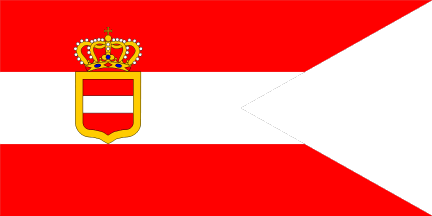
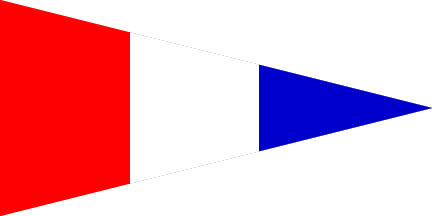
Cornette/Pennant of a Senior Officer/Commodore, Austria then
Austria-Hungary 1786–1894;
"Preceding Under Steam and Sail" in The Commercial Code of Signals c1860
- CORNSHEAF
- In heraldry see garbe.
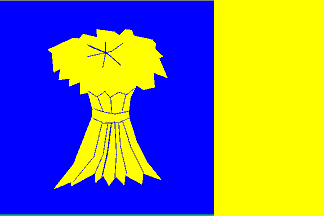
.gif)
Flag and Arms of Reduzum, The Netherlands
- CORNUCOPIA
- An ancient symbol of prosperity and now generally shown as a hollow, horn-shaped
basket usually (but not invariably) filled to overflowing with various kinds of festive
fruit and/or vegetables etc – a horn of plenty.
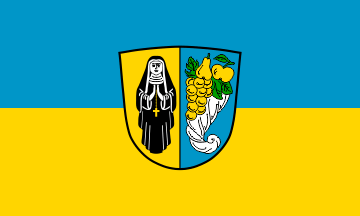
.gif)
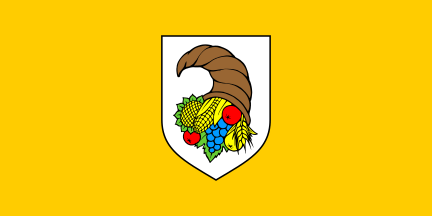
Flag of Nonnenhorn, Germany;
National Arms of Honduras;
Flag of Ivankovo, Croatia
- CORONATION FLAGS (or CORONATION BANNERS)
- A term for those flags or banners (differing from the usual royal standard) which are prepared
specifically for display at the installation (coronation, swearing-in or simple inauguration) of a
monarch and often (but not exclusively) consisting of the relevant royal or
national arms on a plain field – a "rijksvaandel",
riksbanner, royal banner or
banner of the realm (see also
greater arms
under arms, installation flags
and royal standard 1)).

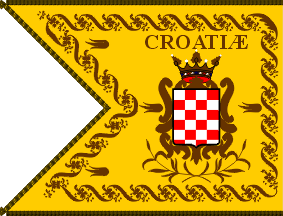
Coronation Flags (riksbanner), Norway 1906 and 1818 (official website);
Flag of Croatia for the Coronation of Ferdinand V in Bratislava 1830
- CORONET
- 1) Generically on flags, a crown without a curved bar across the top that
may be seen in a wide variety of shapes and circumstances – an open crown
(see also antique crown,
civic crown,
crown,
mural crown and
naval crown and
provincial crown).
2) Specifically on flags, the term may be used when a hereditary ruler (or
former hereditary ruler) is of a lesser rank than that of crowned monarch – a princely,
arch-ducal or grand-ducal coronet (see also electoral cap).
3) In English heraldry a crown without cross bar across the top as 1) above,
but also a symbol of nobility whose exact design is dependent upon the rank of
the person concerned (see also mantle).
![[coronet]](../images/v/vx-es-al-nc.gif)
![[coronet]](../images/v/vx-coroduke.gif)
![[coronet]](../images/v/vx-cz-bi-vr.gif)
Flag of Nacimiento, Spain;
Coronet of a Duke in English heraldry (Wikipedia);
Flag of Vranov, Czechia
Please note that the use of a cross-bar across the
top to indicate royal status and to differentiate between a crown and a coronet
is of comparatively recent date (in English usage from the reign of King Henry VII, 1485–1509).
- CORPORATE FLAG
- The distinguishing flag of a shore-based commercial concern as opposed to
that of merchant marine company – a commercial flag/pennant (see also
house flag 1) and
logo).
![[Corporate flag]](../images/v/vx-gb$hsbc.gif)
![[Corporate flag]](../images/v/vx-fr$citr.gif)
![[Corporate flag]](../images/v/vx-us$avis.gif)
Flag of HSBC, UK;
Flag of Citroën, France;
Flag of Avis, US
- CORPORATE LOGO
- See logo.
![[corporate logo example]](../images/v/vx-us$panam.gif)
Flag of Pan American Airways, US
- CORPORATION (or CORPORATE) BANNER
- In largely UK usage, a type of processional banner whose symbolism relates to the
corporate body of a town council or corporation, or to the community represented –
see banner 3).
- CORPS FLAG
- 1) See camp flag.
- 2) See branch of service flag 2).
![[Corps flag]](../images/v/vx-racc.gif)
![[Corps flag]](../images/v/vx-us^acen.gif)
Corps/Camp Flag of the Royal Armoured Corps, UK (Graham Bartram);
Flag of the Corps of Engineers, US
- CORSAIR
- See jolly roger 1) and privateer(s).

Flag of Edward Lowe, Early 18th century
- CORSAIR ENSIGN
- See privateer ensign
and jolly roger 1).
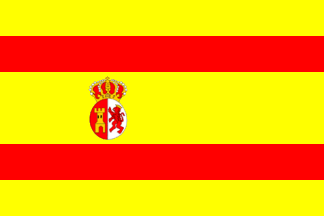
Corsair/Privateer Ensign, Spain 1820

.jpg)

.gif)
.gif)
.gif)







.gif)



![[coronet]](../images/v/vx-es-al-nc.gif)
![[coronet]](../images/v/vx-coroduke.gif)
![[coronet]](../images/v/vx-cz-bi-vr.gif)
![[corporate logo example]](../images/v/vx-us$panam.gif)
![[Corps flag]](../images/v/vx-racc.gif)
![[Corps flag]](../images/v/vx-us^acen.gif)





.gif)
![[Corporate flag]](../images/v/vx-gb$hsbc.gif)
![[Corporate flag]](../images/v/vx-fr$citr.gif)
![[Corporate flag]](../images/v/vx-us$avis.gif)